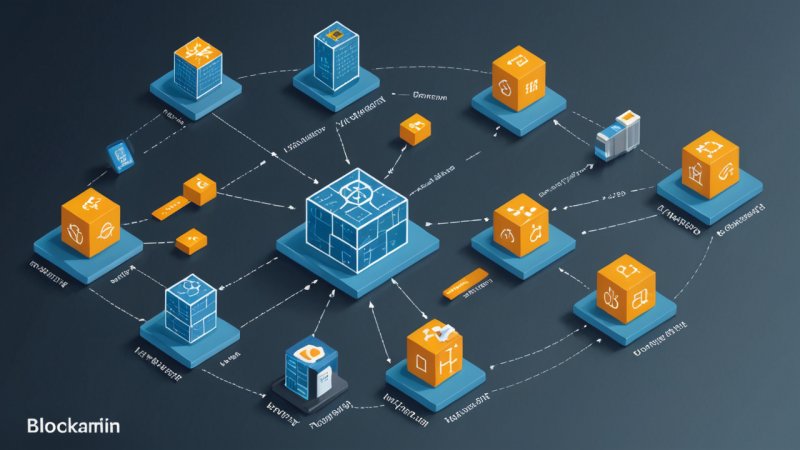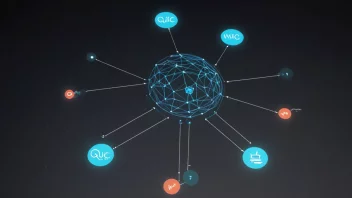Blockchain technology has emerged as a transformative force across various sectors, promising to enhance efficiency, transparency, and security in traditional industries. By leveraging its decentralized nature and cryptographic principles, businesses can not only streamline operations but also foster trust among stakeholders. This article delves into how blockchain can drive innovation in traditional industries, examining its implications, applications, and future potential.
Understanding Blockchain Technology
At its core, blockchain is a distributed ledger technology (DLT) that records transactions across multiple computers in a manner that ensures the integrity and security of the data. Each transaction is bundled into a block and linked to the previous block, forming a chain that is immutable and verifiable. The key features of blockchain include decentralization, transparency, and security, enabling various applications ranging from cryptocurrencies to supply chain management.
Key Components of Blockchain
To appreciate how blockchain drives innovation, it is essential to understand its fundamental components:
- Nodes: These are individual computers that participate in the blockchain network. Each node stores a copy of the entire blockchain, contributing to its decentralized nature.
- Blocks: Blocks contain transaction data, a timestamp, and a hash of the previous block, ensuring the continuity of the chain.
- Consensus Mechanisms: These are algorithms used to achieve agreement on the state of the blockchain. Common mechanisms include Proof of Work (PoW) and Proof of Stake (PoS).
- Smart Contracts: Self-executing contracts with the terms of the agreement directly written into code, facilitating automated and trustless transactions.
Applications of Blockchain in Traditional Industries
Blockchain's potential to innovate traditional industries is vast, with numerous applications across sectors such as finance, healthcare, supply chain, and real estate. Here are some noteworthy examples:
1. Financial Services
The financial sector has been one of the earliest adopters of blockchain technology. Financial institutions leverage blockchain for various purposes, including:
- Cross-Border Payments: Blockchain facilitates faster and cheaper international remittances by eliminating intermediaries.
- Fraud Prevention: Enhanced security features reduce the risk of fraud and hacking, protecting sensitive financial information.
- Decentralized Finance (DeFi): Innovations like lending, borrowing, and trading can occur without traditional intermediaries, democratizing access to financial services.
2. Supply Chain Management
Blockchain enhances transparency and traceability in supply chains. Key benefits include:
- Product Verification: Consumers can verify the authenticity of products, ensuring they are not counterfeit.
- Real-Time Tracking: Stakeholders can track products through the supply chain, improving inventory management and reducing waste.
- Smart Contracts: Automating transactions based on predefined conditions can streamline operations and reduce delays.
3. Healthcare
In healthcare, blockchain can revolutionize data management and patient care. Its applications include:
- Patient Data Management: Securely storing and sharing patient records among healthcare providers while maintaining patient privacy.
- Drug Traceability: Ensuring the integrity of pharmaceuticals by tracking them through the supply chain.
- Clinical Trials: Enhancing transparency and trust in clinical trial processes by securely recording trial data on a blockchain.
4. Real Estate
Blockchain technology can streamline real estate transactions by:
- Reducing Transaction Costs: Eliminating intermediaries can lower costs associated with buying and selling property.
- Title Management: Providing a secure and immutable record of property titles, reducing disputes over ownership.
- Tokenization: Fractional ownership models can democratize access to real estate investment.
Challenges and Considerations
While the potential of blockchain in traditional industries is significant, several challenges must be addressed:
1. Scalability
Many blockchain networks face scalability issues, making it challenging to handle large volumes of transactions efficiently. Solutions such as layer 2 protocols and sharding are being explored to overcome these limitations.
2. Regulation
The regulatory landscape for blockchain is still evolving. Ensuring compliance with existing laws while fostering innovation is a critical challenge for businesses.
3. Interoperability
Different blockchain networks often operate in silos, making it difficult for them to communicate and exchange data. Developing standards for interoperability is crucial for widespread adoption.
4. Security Concerns
While blockchain is inherently secure, vulnerabilities may still exist in smart contracts and other components. Rigorous testing and audits are necessary to identify and mitigate these risks.
Case Studies of Blockchain Innovation
1. IBM Food Trust
IBM Food Trust is a blockchain-based platform that enhances transparency and traceability in the food supply chain. By enabling stakeholders to track food products from farm to table, it helps reduce food fraud and waste while increasing consumer confidence.
2. De Beers and Everledger
De Beers partnered with Everledger to use blockchain for diamond traceability. By recording the provenance of diamonds, the initiative helps ensure ethical sourcing and combats conflict diamonds.
3. Estonia’s E-Residency Program
Estonia has implemented blockchain technology to secure digital identities and e-residency services. This allows entrepreneurs from around the world to register businesses, open bank accounts, and access various services remotely.
Future Prospects of Blockchain in Traditional Industries
The future of blockchain in traditional industries looks promising, with ongoing research and development paving the way for innovative solutions. As businesses increasingly recognize the benefits, we can expect:
- Wider Adoption: More industries will embrace blockchain as a core component of their operations.
- Enhanced Collaboration: Collaboration between industries and technology providers will drive the development of tailored blockchain solutions.
- Integration with Emerging Technologies: The convergence of blockchain with AI, IoT, and other emerging technologies will create new opportunities and efficiencies.
Conclusion
Blockchain technology holds the potential to drive significant innovation in traditional industries by enhancing efficiency, security, and transparency. As businesses explore and implement blockchain solutions, the landscape of various sectors will continue to evolve. While challenges exist, the ongoing advancements in blockchain technology and its applications signal a transformative future. By embracing this technology, traditional industries can not only adapt to the changing environment but also lead the way in innovation and sustainability.






